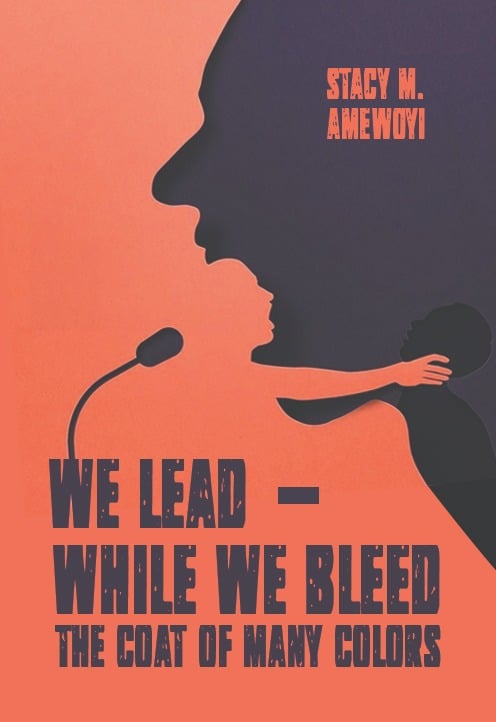In her latest book, We Lead While We Bleed, celebrated author and philanthropist Stacy M. Amewoyi delves into the often unacknowledged challenges faced by leaders in ministry. This work intricately examines the interplay between faith, leadership, and the personal sacrifices that often accompany the demanding role of spiritual leaders. Now available to the public, Amewoyi’s book gives insight into the unseen struggles of contemporary apostles, pastors, and prophets, shedding light on the hidden costs associated with leadership in the spiritual realm. The author, originally from Ghana, is not only an influential writer but also a humanitarian, greatly impacting the lives of orphans, widows, and underserved individuals through her philanthropic initiatives via the Stacy M. Foundation. Her literary contributions aim to foster empowerment and inspire readers towards meaningful change.
We Lead While We Bleed opens with a forthright discussion of the darker realities faced by spiritual leaders. Chapter 1, titled "Men in Ministry," recounts the tumultuous journeys of influential male figures in the ministry, revealing the trials they endured that often go unnoticed. One prominent figure highlighted is Benson Idahosa, whose miraculous life story exemplifies resilience amidst hardship. Born into poverty and health struggles, Idahosa’s life was forever altered after a divine encounter with a pastor during a church service. As Amewoyi narrates, this pivotal moment catalyzed his dedication to preaching and spreading the gospel internationally, overcoming substantial adversities, including financial issues and personal loss. His unwavering faith and commitment to saving souls catalyzed massive evangelistic crusades, making a profound impact on countless lives. Through his story, Amewoyi encapsulates the essence of spiritual leadership, revealing the immense dedication required to serve others while grappling with one’s own wounds.
As the narrative unfolds, Amewoyi introduces readers to female leaders who resonate with similar themes of perseverance and pain. In Chapter 3: "Women in Ministry," the book presents significant women figures, including Kathryn Kuhlman and Aimee Semple McPherson, known for their powerful ministries yet deeply personal struggles. Kuhlman, for instance, is portrayed as a healing minister who faced intense public scrutiny and personal heartbreak, particularly following her controversial divorce. Amewoyi notes that this period of adversity ultimately led Kuhlman to discover her true purpose, demonstrating the transformative power of sorrow. This chapter emphasizes that poignant personal battles can often precede profound spiritual impact, showcasing that even those who seem invincible can be profoundly human and flawed in their journeys of faith.
Amewoyi bravely tackles sensitive topics in Chapter 7: "Sexually Abusive Men on the Pulpit," addressing serious scandals that have shaken various religious institutions globally. This chapter provides a sobering commentary on the critical need for accountability within the church. With profound compassion and steadfast resolve, Amewoyi insists that while divine grace is plentiful, it should not result in the circumvention of justice for victims of abuse. This chapter serves not only as a call to action for accountability among church leaders but also resonates with messages of hope and healing for those impacted by such transgressions. Amewoyi emphasizes that recognizing uncomfortable truths is essential for real healing, urging an integrity shift among emerging leaders in theology and morality.
In the book’s concluding chapters, Amewoyi reflects on the enduring legacies of influential spiritual leaders. In Chapter 13: "The Legacies," she emphasizes how the impacts of figures such as Smith Wigglesworth and William J. Seymour continue to reverberate throughout history. Wigglesworth’s legacy is one marked by miraculous faith healing and an unwavering belief in the Holy Spirit’s capacity to enact profound change. Seymour, widely recognized for initiating the Azusa Street Revival, played an instrumental role in sparking the Pentecostal movement. Amewoyi showcases how these leaders’ faithful responses to divine callings resulted in a significant spiritual awakening that transcended borders and ages. Their stories serve as reminders that one person’s commitment to serving God can initiate revolutionary movements within the church and beyond.
Ultimately, We Lead While We Bleed serves as a testament of hope, encouraging readers to recognize that amidst the pain and challenges faced, God’s grace remains abundant. Amewoyi reiterates that authentic leadership within the kingdom of God is defined not by perfection but perseverance. Her concluding reflections resonate with a powerful message: “We may lead while we bleed,” she declares, “but it is through our wounds that God’s glory is revealed.” The book is positioned not only as an eye-opening exploration of the demanding nature of spiritual leadership but also as a source of strength and encouragement for those navigating similar paths. With richly woven narratives and personal testimonies, Amewoyi’s book is undeniably a vital resource for anyone involved in ministry or leadership, shedding light on the complexities of faith and unwavering commitment to serving others.
We Lead While We Bleed is now ready for purchase and is essential reading for anyone seeking a deeper understanding of the intricate dynamics of leadership within a spiritual context. By harmonizing powerful stories with practical insights, Amewoyi invites her audience to walk the often-difficult journey of leadership together, assuring them that even in their challenges, they are not alone.


